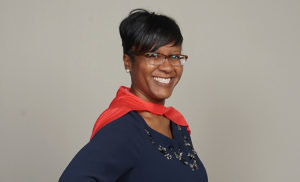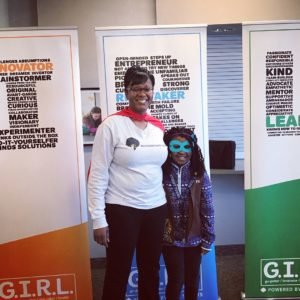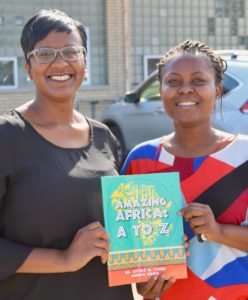Local educator and author Artika Tyner started her own publishing company when told people of color don’t read
 Artika Tyner and the Planting People, Growing Justice Board is offering ebooks free of charge on Amazon in order to support youth in their leadership development journey. The Justice Makes a Difference activity ebook is also free of charge. (Photo submitted)
Artika Tyner and the Planting People, Growing Justice Board is offering ebooks free of charge on Amazon in order to support youth in their leadership development journey. The Justice Makes a Difference activity ebook is also free of charge. (Photo submitted)By JAN WILLMS
Social justice has been a part of Artika Tyner’s life since she was a child. “A big piece of it was growing up in the Rondo community,” said Dr. Tyner, an educator, author and advocate for justice.
She serves as the founding director of the Center on Race, Leadership and Social Justice at the University of St. Thomas School of Law. Dr. Tyner teaches leadership coursework on ethics, critical reflection and organizational development. Her research focuses on diversity/inclusion, community development, and civil rights.
Promoting literacy and books led Dr. Tyner to gather a team of volunteers to meet in her living room and produce books and learning materials.
“Promoting literacy is personal to me as an educator,” Dr. Tyner said. She helped found “Planting People, Growing Justice Leadership Institute” from the group that first met in her living room.
The organization has launched a “Leaders are Readers” campaign and donated over 1,000 copies of its book, “Justice Makes a Difference: The Story of Miss Freedom Fighter, Esquire,” a children’s book on leadership and social justice. It has partnered with local retailers and donated over 1,500 children’s books and cases of school supplies.
According to Dr. Tyner, the organization has inspired over 5,000 children around the world through its school visits and has established a social enterprise model to sell books and raise funds to donate books to children in need.
“Planting People, Growing Justice Leadership Institute” has a mission to plant seeds of social change through education, training and community outreach.
“Only 32 percent of Minnesota’s African American children are reading at grade levels by the time they reach fourth grade,” Dr. Tyner said. “Not reading at grade level at this point increases the likelihood of dropping out of school by four times. This also drastically increases the likelihood of future incarceration.”
Dr. Tyner said she served on the board of African American Babies Coalition. “I was confused about being on the board since I was not a parent,” she claimed. “I was not sure I was the best advocate.”
But she became alarmed by the early learning gap from ages 0 to 3. “There is not enough advocacy and support for children of this age,” she noted. “We focus on K-12, so one of the goals of our publishing company is to cover the whole spectrum of learning for the whole family.”
 ‘Kofi Loves Music’
‘Kofi Loves Music’
The publishing company, Planting People Growing Justice Press, has published seven books that Dr. Tyner has written or co-written. The latest book, published in January of this year, is “Kofi Loves Music.” It is the first board book that focuses on early learners.
Dr. Tyner said the story emerged when she was visiting Ghana and watching a documentary about going to different places to enjoy music. The book features African instruments, such as the Udo, and instruments that can sound like jazz or rock and roll. Dr. Tyner said the book honors cultures of the world.
During her visit to Ghana, Dr. Tyner had an opportunity to introduce some of her books to young people. “I had an impromptu opportunity to visit Akwamu Kingdom and was asked if I could speak with a few students,” she said. “I agreed, and there were over 1,500 students in the room.”
 Dr. Artika R. Tyner (left) and Monica Habia hold the book they worked on together, “Amazing Africa: A to Z. The Minnesota Coalition of Black Publishers will be hosting a virtual town hall forum on June 27 from 2-4 p.m. It will showcasing local authors and their work in advancing anti-racism. More details to be announced via the Facebook page @plantingpeoplegrowingjustice. ”The tragic death of Mr. Floyd and the aftermath has only deepened my resolve to continue the work of Planting People, Growing Justice,” said Tyner. (Photo submitted)[/caption]
Dr. Artika R. Tyner (left) and Monica Habia hold the book they worked on together, “Amazing Africa: A to Z. The Minnesota Coalition of Black Publishers will be hosting a virtual town hall forum on June 27 from 2-4 p.m. It will showcasing local authors and their work in advancing anti-racism. More details to be announced via the Facebook page @plantingpeoplegrowingjustice. ”The tragic death of Mr. Floyd and the aftermath has only deepened my resolve to continue the work of Planting People, Growing Justice,” said Tyner. (Photo submitted)[/caption] Only 10% of authors are black
Dr. Tyner said she tries to focus on writing on weekends and evenings. “I have had a book inside me for my whole life, the book I wanted to see as a child,” she said.
Although she said her mother is a lifelong educator and she was very fortunate in having many education lessons happen at home, she did not see books with characters who looked like her.
But she did have mentors and people who inspired her, such as Ida B. Wells, journalist; and Thurgood B. Marshall and Charles Hamilton Houston, who fought for civil rights and the desegregation of schools.
Dr. Tyner said she started her own publishing company after some publishers she went to tried to indicate that people of color didn’t read. “Or they told me I was ahead of my time, and this happened just within the last decade. It’s the same way some don’t think African Americans have assets or capital for small businesses.”
Only 10% of authors are people of color, according to Dr. Tyner. She said lack of access is the biggest reason for this statistic.
“I had business acumen and community support to make my project come alive,” she said, noting that not all authors or activists have that. “I crowd-funded my first book and got $10 donations, which built up to over $20,000 for us to donate books around the world.”
Race matters
Dr. Tyner explained that although the United States has only about 5% of the world’s population, it incarcerates over 20% of the world’s prison population.
She said that race matters when “African-American adults are 5.9 times more likely to be incarcerated than whites and Hispanics are 3.1 times as likely.”
Dr. Tyner said she was a child witness to the “War on Drugs” and saw firsthand the criminal justice challenges at the intersections of race and poverty. “I decided to take action,” she said.
“It took me on a mission. If inmates learn how to read in prison, they can read their indictments. It shows how essential the literacy piece is.”
Reflecting on her work as both educator and writer, Dr. Tyner said she was inspired by Chinua Achebe, who said, “The writer cannot expect to be excused from the task of re-education and regeneration that must be done.”
Dr. Tyner, who is currently researching diversity in dolls for her organization, said she believes education is the key to justice.
“You can learn how to think critically and problem-solve,” she said. “Education also unleashes real magic, an ability to imagine, innovate and create.”
Comments
No comments on this item Please log in to comment by clicking here